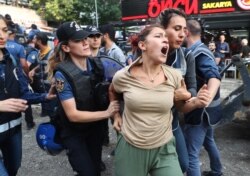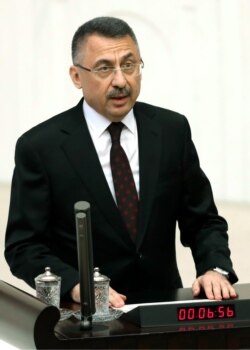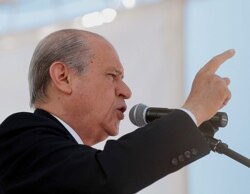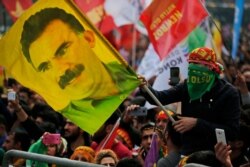Turkish authorities have expelled the mayors of the three main cities in the predominantly Kurdish southeast, provoking protests and political condemnation. Their expulsion comes as Turkish forces are poised to launch a military operation against Syrian Kurdish militants.
The pro-Kurdish HDP mayors in Van, Mardin, and Diyarbakir, were replaced by state-appointed trustees Monday. The ruling AKP accuses the mayors of supporting the Kurdish insurgent group the PKK, an allegation the HDP denies.
The Turkish Interior Ministry said the personnel action was part of a terrorism investigation.
"For the health of the investigations, they have been temporarily removed from their posts as a precaution," read an Interior Ministry statement.
More than 400 people were detained Monday in a nationwide operation against the outlawed PKK, which Turkey, the European Union and United States have designated as a terrorist organization.
"This is a new and clear political coup. It also constitutes a clearly hostile move against the political will of the Kurdish people," read a joint statement by the HDP leadership.
Under emergency powers introduced after a failed coup in 2016, and a subsequent new constitution, which gave sweeping powers to the presidency, the HDP has faced a significant crackdown.
In the past three years, 88 HDP mayors have been removed from office and dozens of members of parliament jailed, including the party's former leader, Selahattin Demirtas.
The Van, Mardin and Diyarbakir mayors were elected with more than 50% of the vote in local elections last March. Their election ended the rule of state-appointed trustees.
Protests erupted in all three cities as news spread about their expulsion. Security forces using tear gas and water cannons quickly quelled the unrest. Anger over their dismissals also led to demonstrations in other towns and cities.
Ankara strongly defended the mayors' removals.
"Action against municipalities that supported terrorism is inevitable in our struggle for democracy," said Vice President Fuat Oktay.
The main opposition, CHP, was quick to condemn the dismissals. Deputy leader Sezgin Tanrikulu called the action a "coup." Veli Agbaba, another senior party figure, equated it with fascism.
"Coups are not just made with tanks, cannons and rifles. The removal of three elected mayors in their fourth month in office and replacement with appointed caretakers is a coup against the political preferences of the people," Tanrikulu wrote in a statement.
Condemnation extended to former close colleagues of Turkish President Recep Tayyip Erdogan.
"The dismissal of the newly elected mayors is not right for our democracy," tweeted former President Abdullah Gul.
While Erdogan's former prime minister, Ahmet Davutoglu, also criticized the mayors' dismissal, saying the democratic will has to be respected, both Davutoglu and Gul, now politically estranged from Erdogan, are reportedly working on setting up rival political parties.
Some observers are interpreting Monday's development as an attempt by Erdogan to reestablish his political authority after suffering a series of political blows, culminating in the loss in March of the mayorship in Istanbul, ending 15 years of rule by his AKP.
"This is a power play by Erdogan," said international relations professor Huseyin Bagci of Ankara's Middle East Technical University, "as he (Erdogan) is facing challenges of new political parties by Gul and Davutoglu, as well as other challenges in and outside Turkey.
"I expect the other HDP mayors to be removed soon, that is another 11 mayors, I think," Bagci added.
Bagci says he thinks Erdogan needs to explain his actions. "The government says the HDP is linked to terrorism, but the courts allowed the party and these mayors to participate in the elections only a few months ago."
The HDP is calling on all political parties to take a stand. "All political parties and society should react to this coup against the will of the people," Garo Paylan, an HDP parliamentary deputy, said on Twitter. "If you remain silent, then the next in line could be Ankara and Istanbul."
In the aftermath of electoral setbacks, Erdogan is increasingly courting Turkish nationalists. The AKP's parliamentary coalition partner, the national MHP leader Devlet Bahceli, welcomed Monday's personnel action against the mayors.
In his early years of rule, Erdogan as prime minister had courted Kurdish voters, granting several concessions on language rights and initiating a peace process with the PKK that collapsed amid mutual recrimination in 2015.
"As he (Erdogan) uttered so many times, he really doesn't understand why Kurds are still demanding," said sociology professor Mesut Yegen of Istanbul's Sehir University.
"He basically thinks all their problems have been solved. He is a man that really can't understand the basics of the Kurdish question. But Kurdish people are really furious," Yegen added.
There had been speculation that Erdogan was considering resuming peace talks with the PKK in a bid to rejuvenate his political fortunes. Several opinion polls indicate plummeting support for his AKP, and his presidency.
Earlier this month, imprisoned PKK leader Abdullah Ocalan issued a statement through his lawyers in which he called for a restart of peace talks. Erdogan did not respond to Ocalan's call.
The firing of the mayors is being interpreted as Erdogan committing his fortunes to courting Turkish nationalists, who vehemently oppose any peaceful resolution of the decades-long conflict with the PKK.
A further escalation in the conflict against the PKK is looming. Turkish forces are poised to launch a major offensive against the Syrian Kurdish militia the YPG, which Ankara accuses of being affiliated with the PKK.
The YPG is a close ally in Washington's war against the Islamic State terror group. Earlier this month, in talks in Ankara, U.S. officials tentatively agreed to work together to address Turkish security concerns over the YPG. But many details of that cooperation remain unresolved.
Observers say the latest crackdown on the HDP indicates Erdogan remains determined to step up pressure both inside and outside Turkey on what he perceives as security threats.








